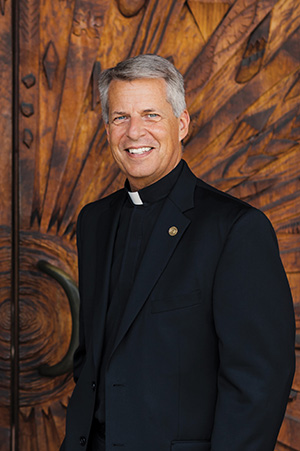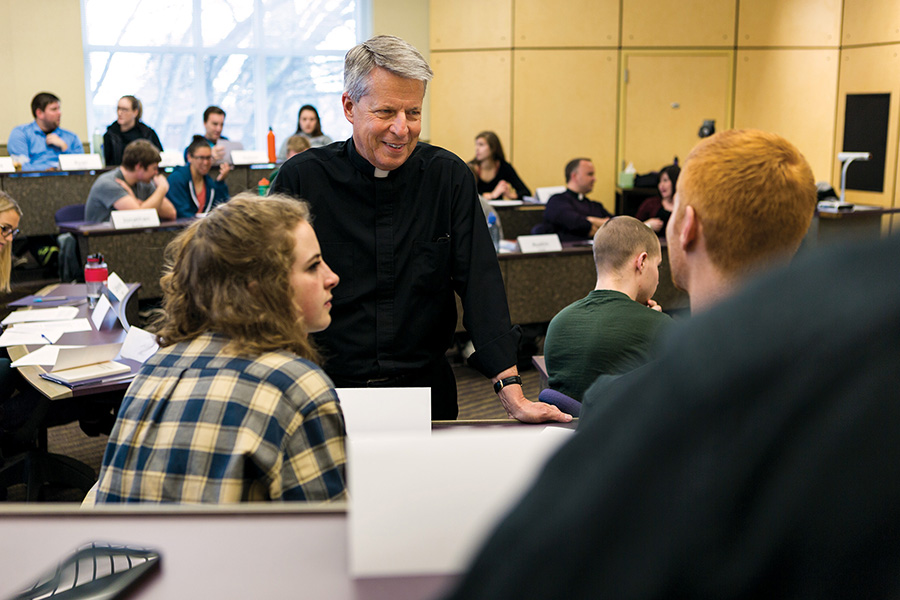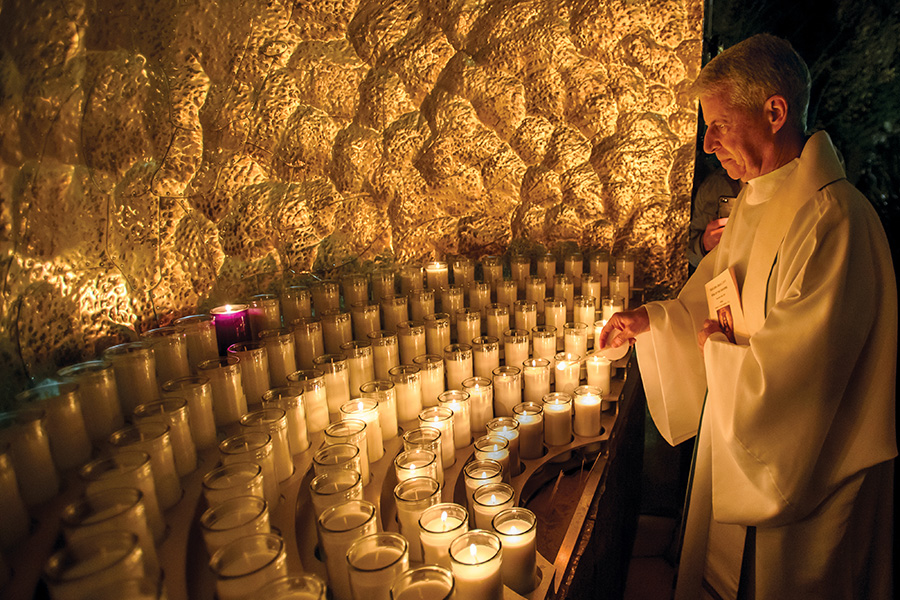
Portland Magazine
President
June 9, 2021
By Jessica Murphy Moo
 FR. MARK POORMAN, CSC, remembers the moment clearly. He was in eighth grade. His family had recently moved from California to Illinois for his dad’s new job as founding president of Lincoln Land Community College (LLCC). After baseball practice one day, his dad picked him up and drove over to a soybean field outside Springfield. They got out of the car—the great expanse of that mid-western sky above them—and his dad said, “Well, this is where it’s going to be.”
FR. MARK POORMAN, CSC, remembers the moment clearly. He was in eighth grade. His family had recently moved from California to Illinois for his dad’s new job as founding president of Lincoln Land Community College (LLCC). After baseball practice one day, his dad picked him up and drove over to a soybean field outside Springfield. They got out of the car—the great expanse of that mid-western sky above them—and his dad said, “Well, this is where it’s going to be.”
The “it” his father, Robert Poorman, now age 94, was referring to was the site of LLCC’s first and temporary campus, where the school’s first class graduated 149 students and eventually grew to an overall enrollment of 13,000.
“He was a great builder,” Fr. Mark says, and he’s quick to say that he means “builder” in more ways than one: a builder of college infrastructure, yes, but also a builder of a college’s vision, and as Fr. Mark says, “a vision of the way things could be.”
The moment made a deep impression on that young eighth grader, who would later become University of Portland’s 20th president, in addition to becoming his own version of a builder-in-more-ways-than-one.
Of course young Mark standing on that bean field didn’t yet know the path his life would take. In the moment, he knew he liked baseball and that, when you land in a new junior high school in the spring, baseball might be a way for a new kid to make fast friends, even if the snow on the ground at the beginning of the season in Illinois was a bit of a shock to the California kid’s system. He knew he loved his tight-knit family. He knew his dad would take him to the hardware store when he wanted to talk about important “life” stuff. His family had modeled that a life of faith was important, but he didn’t necessarily know how these lessons and values would manifest in his own life.
During his college years, he started to see some clues. At University of Illinois, the robust Newman Club campus ministry offerings sparked the light of his faith and his academic interest in Christian ethics. He saw the importance of intentional Catholic groups to the spiritual growth of a young adult, the partnerships of lay people in the work of the faith (which happens to be a strong value of the order of the Congregation of Holy Cross), and the ways in which priest-mentors could walk with young people during their formative college years.
He eventually realized—as his education and vocational formation evolved over many years—that he could be that priest-mentor for others.
Caleb Hilger ’15, who later took Fr. Mark’s Character Project class at University of Portland, knew Fr. Mark first as a co-resident of Schoenfeldt Hall and later through the League of Extraordinary Gentleman, a Campus Ministry group in which young men engage with mentors about what it’s like to be a man of faith in society and “how you can be a servant leader.” Fr. Mark was Caleb’s mentor. When Fr. Mark offered the class at UP, Caleb was quick to sign up.

Before Fr. Mark started to work at University of Portland, he was a theology professor—his field was applied ethics—and vice president of student affairs at the University of Notre Dame. He was also a member of UP’s Board of Regents. When he was on his way out to The Bluff for a Board meeting, he cooked up an idea with fellow Regent, close friend, and then-Notre Dame business school dean Carolyn Woo.
He wondered: What if we could create an undergraduate class that looked at the ethical decisions of the everyday? Not another class for ethics majors or theology majors. No. Those were already in existence at Notre Dame and had their purpose. He was envisioning something new. What if they offered a class that focused on the development of one’s character, the values and habits that move people toward becoming the person they want to be? And what if they offered the class to students of all disciplines—to engage young people in ethical decision-making that would be with them their whole life long in whatever career or life pursuit they chose? We want theologians to have a grounding in applied ethics, sure, but don’t we also want people in business and medicine and education and child rearing and overall engaged citizenship to have these skills?
Carolyn Woo was sold. They co-taught the class—to great success—at Notre Dame.
Woo holds immense admiration for Fr. Mark as an administrator and as a teacher. “Fr. Mark, as a teacher, is able to hold the attention of students. He engages them. He has an ear for where youth are.... He solicited probing questions and drew people into self-understanding,” she says.
When Fr. Mark came to UP, first as executive vice president, and later as president, he wanted to bring the class here too.
He ended up talking about the class with the late Amy Dundon-Berchtold and alumnus Jim Berchtold ’63. Amy saw the practical, worldly applications of the Character Project. She had encountered ethical and unethical decision-making in her real estate investment career; she’d always had to navigate that. Amy and Jim decided to support the class, and they became an important part of the University of Portland story during Fr. Mark’s tenure as president.
Alissa (Strauss) Hilger ’16 took the Character Project class a year after her (now) husband, Caleb. She says she, too, saw practical applications of the Character Project out in the real world. “It challenged me to consider what values I wanted to bring forward in my life,” she says. And the skills she gained in the class that had to do with navigating different values were also practical skills for her job as a nurse on the Seattle Children’s Hospital oncology ward. “In the workforce, there are a lot of opinions in the care of a child. There are parents who have different opinions, doctors who have different opinions, nurses who have different opinions.... I had the ability to acknowledge the other perspective without getting fired up.”
They are now married with three children. Fr. Mark presided over their wedding. He is a part of their story. They admit that every so often when they experience or read about a moral dilemma situation in the newspaper, they say, “This would be a great topic for the Character Project!”
Co-instructors value the class content as well. After all, developing one’s character is a lifelong challenge. “It has informed my parenting in meaningful ways,” says Dan McGinty, who is director of the Dundon-Berchtold Institute for Moral Formation and Applied Ethics. The institute and its robust programming, such as Ethics Week and annual student research fellows, grew out of the class and support from Amy and Jim.
Brenda Greiner, director of the Shepard Academic Resource Center, who last year was recognized by the Congregation of Holy Cross with a Holy Cross Spirit Award for her collaboration with CSCs, has loved being a part of the class both because of the students—“It was rewarding to see them having an experience they’re going to remember”—and because she got to see a new side to Fr. Mark. She knew him as an administrator. In the class, she says, “I really got to see him in his vocation as a priest and educator.”
It is remarkable that Fr. Mark continued to teach during the span of his presidency. Most presidents don’t. Being a university president is obviously a big job with all kinds of pressures and demands. But by making the time to teach he sent a message about what he valued.
Being a president of a university is a great topic for a character project too, is it not? Think of all the thorny questions and competing demands. How do you honor and lead the many different individuals coming from different places and different life experiences so that they learn and grow and contribute in positive ways to the world? How do you affirm a university’s Catholic mission while also valuing the contributions of other perspectives? How do you lead a university community through a global pandemic? How do you handle the responsibility of leading a community through a campus tragedy or controversial event?
Sometimes campus controversies became part of the discussion in class, because in that classroom Fr. Mark was a president and priest, but he was also an individual wrestling with the stuff of life right along with the students.

When Fr. Mark gave his inaugural address in 2014, he was clear on the value of the Holy Cross education and Catholic social teaching. He acknowledged the elements of UP’s vibrant, multi-faceted community, from its focus on the students to its brilliant and devoted faculty and staff and the community of alumni doing good work out in the world. He then noted an evident need—for more academic and residential space—and set a clear goal: “As we grow, the structural needs of the University are also growing.... We face the need for additional academic and residential space worthy of the importance we place on the pursuits of our students.”
He made good on that day-one promise.
During his tenure the following building projects were completed: the Pilot House renovation, Lund Family Hall, Dundon-Berchtold Hall, the School of Nursing’s Simulated Health Center and Ambulatory Care Unit, the renovation of the Joe Etzel Baseball Stadium, and Chiles Plaza. He continued the long-term forward-press on the new Franz River Campus development and helped to secure support to build the Nelson Physical Plant Building and the Shiley-Marcos Center for Design and Innovation. He also helped to conceive and raise funds for the Marian Grotto situated just next to the Chapel of Christ the Teacher. All of these commitments and partnerships—with supporters who are devoted to the vision of what a University of Portland education can offer the world—have indeed improved the academic, residential, and spiritual student experience. Though he is quick to say these achievements are “collective achievements” and that a president can never claim individual credit, these buildings are a part of Fr. Mark’s legacy.
The University will also build on the strategic work of his tenure—the goals and tenets of “Vision 2020” (UP’s most recent strategic plan) and the continued focus on the University’s robust liberal arts core curriculum. Just as he wanted his Character Project class to be open to students in every discipline, he believes that a well-rounded liberal arts education helps students in every field and graduates in every career to solve problems in the real world. He also recently established a committee of campus leaders charged with finding new ways for UP to embody and enhance the Catholic vision of educating the whole person.
He says that, with each new project or moment of strategic decision-making, two questions kept him grounded and focused: “What is good for the students? How does it impact the experience of the student?”
During a pandemic, the answers to these questions took on new shapes. This year, Fr. Mark and the University leadership have had to make some hard choices to keep students safe and keep the University moving forward.
Fr. Mark notes the “army of people” who made everything work this year, from the President’s Leadership Cabinet to staff’s adaptability to the faculty’s unimaginably quick shift to online learning. With the development team, he set up the Presidential Hope Fund to help students with unexpected needs during the pandemic—an all-hands-on-deck effort to make sure deserving students could complete their education.
In March, I spoke with Jean Paul Mugisha ’18. He was an engineering major, and he, too, took the Character Project class and loved it. He is now an electrical engineer working at Intel. Originally from the Congo, Jean Paul lived with his family in a Rwandan refugee camp for 17 years. In 2014 his family was relocated to Portland. Jean Paul started college courses at Portland Community College and ended up meeting Fr. Mark, who saw Jean Paul’s potential. Fr. Mark was right. He found a supporting scholarship, and Jean Paul thrived at UP.
Jean Paul’s well-wishes for Fr. Mark offer a perfect parting blessing: “It is bittersweet to see him go. My community is going to miss him. He is a super kind person.... I’m praying for him. I pray the community will welcome him, that he goes where he feels loved. He’s a really good person. I hope he keeps in touch with the UP community.”
Thank you, Fr. Mark. We wish you well in this exciting new phase of your career.
Jessica Murphy Moo is the editor of Portland magazine.
University of Portland
5000 N. Willamette Blvd.,
Portland, Oregon 97203-5798
503.943.8000
This website uses cookies to track information for analytics purposes. You can view the full University of Portland privacy policy for more information.
